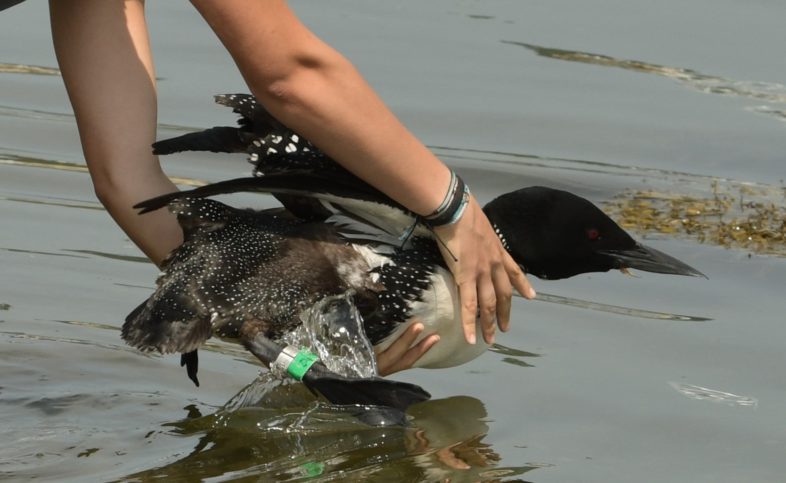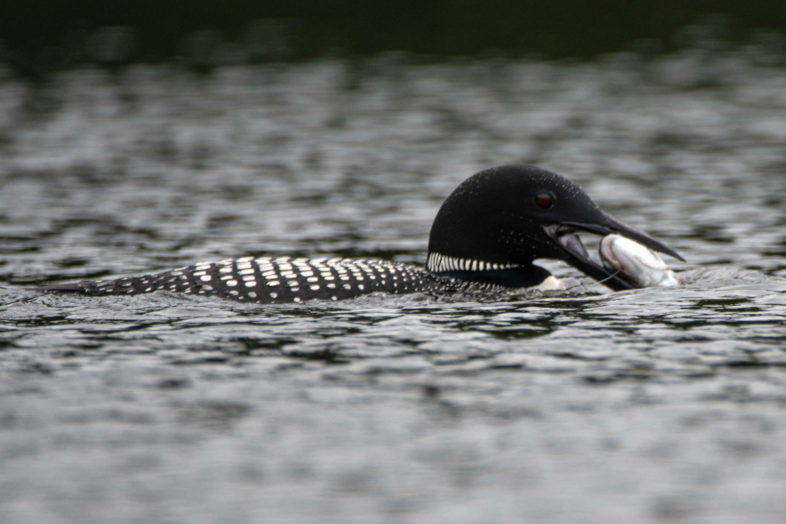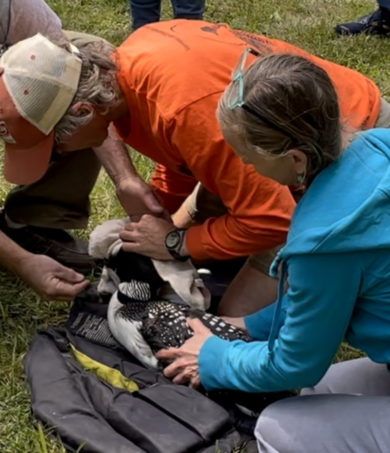
Meg Ryan from Avian Haven releases the rehabbed loon from Lake Eden. © Terry Heitz
As the Common Loon breeding season winds to a close, it’s time to begin reflecting on this year’s results. At this point, our team has confirmed 109 nests with 125 chicks hatched out—surpassing our previous 2019 record by eight nests. Of those 125 chicks, 86 remain, giving us a survival rate of 69%. Chick survival has consistently landed between 70–75% in past years. With a couple lakes still needing a final check, it’s quite possible that a few more chicks could get added to this year’s final tally.
However, there is always more to a loon breeding season than final numbers. The stories of success and disappointment and experiences of our hardworking volunteers also make up an important part.
Fishing Gear Issues
Fishing gear encounters are unfortunately a frequent occurrence in loon life and often prompt a response from biologists. If we’re lucky, we can intervene in time to help the loon recover, however this isn’t always possible. Such was the sad case of a young loon in Londonderry.
Loons have nested on Lowell Lake in Londonderry for 3 years now. The pair lost their chicks in 2019 and 2020 due to territorial fights and possible sickness, so the loon conservation team was hoping for a successful season. This year’s chick was doing well until it got caught in fishing line. Most loons take live bait or hooked fish. This chick became entangled either after taking someone’s hook or in abandoned loose line and sadly didn’t survive.
Thankfully, some fishing gear encounters had better endings. On South Pond in Marlboro, Chris Roberts captured this photo (below) on August 1 of one paired loon swallowing a hooked fish, line and all. While this may seem like a cause for alarm, hooks can dissolve in a loon gizzard’s acids and line can pass through. As of August 25, the loon and its family are still doing well. Fingers crossed.

A loon on South Pond (Marlboro) about to swallow a fish with fishing line and hook. © Chris Roberts
The loon conservation team also responded to another loon on Lake Eden who became tangled after trying to snag bait off an angler’s line. Vermont Fish and Wildlife Department game warden, Jeremy Schmid, tried catching it a few days later, but the bird was too fast. After 5 days of monitoring, we were prepared to attempt a night rescue using spotlights however the loon beached itself before we could put our plan into action. Thankfully, I was able to catch it and remove some tightly wound line from its mandible and a hook from its neck with help from 15 or so picnic-goers at a family and friends gathering. The loon seemed relatively strong, so we banded and released it. However, it beached again three hours later; something more serious was going on.

Untangling a loon often requires many pairs of hands. Luckily, Adriane Colburn (in blue) and others were around to help! © Jonny Lowry
I picked the loon up that evening and next morning drove it 5 hours to the most experienced waterbird rehabbers around: Avian Haven in Freedom, Maine. They found it had more parasites than normal and started it on medication. It ate a fair amount right away and even more after completing several rounds of parasite medicine. After almost two weeks of treatment, the loon was becoming restless and stronger—a sure sign that it was ready for release. A UVM intern, Ryan Hart, cared for the loon daily and finally released it near Belfast in coastal Maine.
You may be wondering: why an ocean release? Our main reason was to avoid a potential territory dispute. This bird was likely part of a pair whose nest had failed this year. Other loons frequently stop by this lake and visiting loons constantly assess existing territorial pairs and their status. Since this loon was gone from its territory for two weeks, it’s likely that other loons present were already establishing a replacement. If we returned the recovered loon back to Lake Eden, we would be setting it up for a territorial challenge and potential fight—better to release it on neutral waters. Since we banded it, we will know if it returns to Lake Eden in 2022. Birds have amazing homing instincts so it will be interesting to see what happens next year.
Although fishing gear-related issues are common for loons, certain precautions can lessen the risk. Reeling in fishing line when loons are nearby is considered best practice. We also plan on building fishing line disposal containers at many highly fished lakes in 2022 in hopes of reducing future casualties.
Observations from Kata Gilbertson, LoonWatch volunteer
I was lucky to be raised right on the Green River Reservoir (GRR) and Collins Pond. I learned to swim, caught my first fish, and paddled around for hours on these idyllic Vermont waterbodies. My favorite thing about summer near the water is falling asleep to loon calls and then hearing them again at dawn. More recently, my family and I moved overseas, first to the Dominican Republic and then to Saudi Arabia where I am now starting my junior year of high school. I still always look forward to coming home each June and listening to clear, almost mystical loon cries drifting on the pond and reservoir.
This summer, my friend Grace Singer and I volunteered for VCE doing loon surveys on GRR. We paddled out almost every week and kept track of loon numbers, locations, and nests. This year, there are four pairs on GRR. Our role as surveyors included putting out and removing signs, checking on potentially abandoned nests, and taking pictures. While I always enjoyed seeing loons on GRR, I had never thought about their behaviors or nesting process. I found observing the loons’ activities during these visits fascinating. I loved the excitement of spotting a loon emerging from the lake and admired the brave loon parents guarding their eggs. On one of our last paddles, Grace and I saw about 14 loons in a group on a misty, glass-like morning! Remarkable!
Although most chick survival surveys are finished, please feel free to visit Vermont lakes and report on chick presence and absence into autumn. Stay tuned for a full season update in VCE’s fall Field Notes!

Eric, we installed fishing line recycling bins at Waterbury Reservoir this year, on a trial basis, with approval from state parks. Photos are on the Friends of Waterbury Reservoir facebook page. We are cautiously (season not yet over) calling the program a success. We modified the standard design a bit, and it seems to be working well. Feel free to contact me with any questions about our fishing line recycling program!
Eric,
It is wonderful to hear about the success of this year’s loon project. Such a contrast to hot and humid suburban Maryland! I wish you and your loon colleagues continued success.
I’ve been following the pair on Branch Pond since before they even picked their next location. If you’d like a report or photos, let me know! This was their first year since I’ve been tracking them that they raised two chicks instead of one.
Hi Abby,
I met you a few weeks ago at Branch Pond as you were loading your Spitfire onto your car. I was with a couple of worn paddling friends just readying my Swift canoe for the carry to the lake. I was fascinated to learn of the loons there was happy to see them that day!
Any info or photos would be welcome.
By the way seeing your Spitfire influenced me to visit Placid Boatworks and order their 14 ft Oseetah today!
I live in NY in the border of West Stockbridge, Mass. and interested in knowing if any loons in the area. Always searching for natural paddling waters as well. I grew up in VT so was delighted to see loons there!
Happy paddling,
Tom